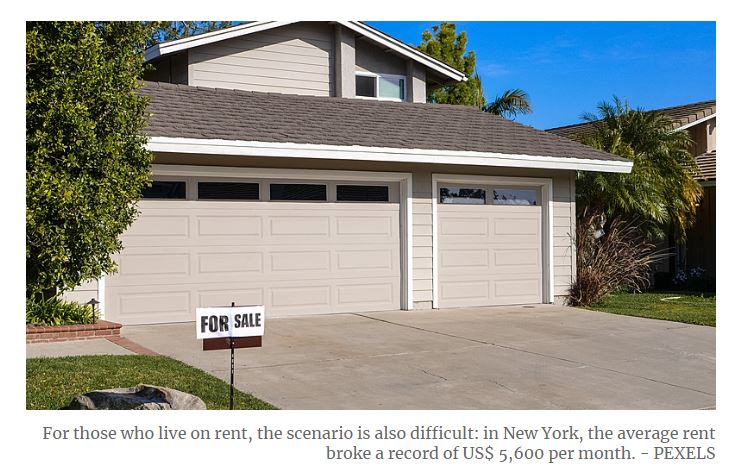On November 29, 2023, Brasil de Fato, interviewed Professor Real Estate® Suzanne Hollander on the dream of homeownership in the United States. The article is shared below, watch the TV Interview here.
Pedro Paiva
Brasil de Fato | New York (USA) |November 29, 2023 at 13:44
Buying a property in the United States is expensive. Very expensive. The dream of owning a home is increasingly becoming a distant dream, especially for the younger generations.
According to the U.S. Department of Housing, the median home price sold in the country has risen nearly 63% in 10 years, jumping from $265,000 in 2013 to $431,000 in 2023. According to experts, there are two major villains in this story: inflation and high interest rates.
The impact of high
interest rates Although far below the Brazilian base rate of 12.25%, interest rates in the US rose from 0.25% in March 2022 to 5.5% in July 2023. Such high interest rates have not been seen in the country for more than two decades. In the last four months, the rate has remained the same, but it is still too high for homeowners to want to move house.
The purpose of high interest rates, according to the Federal Reserve (FED), is to fight inflation. The Fed wants the ratio, which currently stands at 3.7 percent, to reach 2 percent a year.
The justification is that, with the financial aid given by the government during the pandemic, the increase in demand for goods and services overheated the economy, taking inflation from 1.4% in January 2021 to 9.1% in June 2022.
The pandemic
effect This, however, is not the only role of Covid-19 in the current crisis. Itzhack Ben-David, a professor at Ohio State University, spoke to the reporter about the issue.
“We had shortages in groceries,” Itzhak says. If we go back to 2020, 2021, you will remember that there was a shortage of wood for new construction, as well as other materials. And all of that has made building new homes more expensive, which eventually affects the secondary market for existing homes, and that market gets more expensive as well.”
The crisis in the supply chain is another cause of inflation around the world. With production being affected by measures to control the transmission of the Coronavirus, the supply of products has fallen, thus driving up prices.
Rent through the roof
The situation is also not easy for those who pay rent. In January 2020, the average monthly value for a 2-bedroom property in the country was $1,093, today the same property costs an average of $1,320 per month.
In large cities the situation is even worse. In August, New York City hit an all-time high, with median rent of $5,600, according to a survey by DouglasElliman and Miller Samuel.
Since September 5 of this year, a law has been in force in the country’s largest city that prohibits the rental of entire apartments on Airbnb, or other online rental platforms, for less than 30 days. The measure aims to add new properties to the market and try to contain the rise in prices.
 Data recently released by the Fed show that inflation continues to fall. For market analysts, this is an indication that interest rates should decrease in the first half of next year.
Data recently released by the Fed show that inflation continues to fall. For market analysts, this is an indication that interest rates should decrease in the first half of next year.
Ben-David, however, warns that the problem is likely to persist and that new factors are likely to negatively affect home prices in the not-too-distant future.
“I would think that inflation and interest rates are the main causes,” he said. “At a certain point we should start to see the effect of climate change. This is also a possibility, even more so in relatively low-lying areas and close to the Atlantic or Pacific. This should impact prices in the housing market.”
Disclaimer: Professor Real Estate® written materials apply generally to real estate subjects and are not intended to apply to specific legal issues.
Copyright 2024 ~ All rights reserved. ~ Professor Real Estate® Suzanne Hollander
